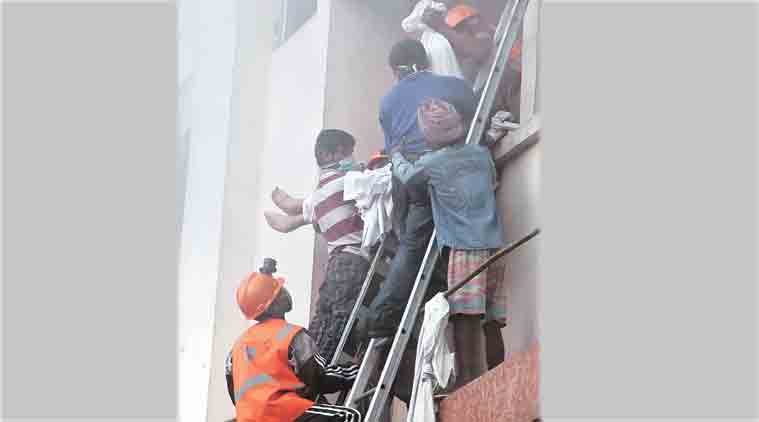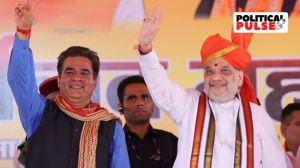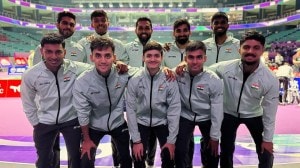- India
- International
Five years ago — another hospital, another city, another fire disaster
Bhubaneswar fire: As all the dimensions of the SUM Hospital tragedy unfold, Indian Express recalls the catastrophic AMRI Hospital fire in Kolkata in 2011, in which 93 people were killed.
 Bhubaneswar fire: Firemen brought patients out through windows as smoke filled the hospital. (File Photo)
Bhubaneswar fire: Firemen brought patients out through windows as smoke filled the hospital. (File Photo)
The Tragedy
At 3.30 am on December 9, 2011, a fire began in the basement of AMRI Hospital in Dhakuria, south Kolkata, and the smoke, sucked into the building’s airconditioning system, worked its way through the rooms and corridors of the seven-storey structure. Ninety-three people — including four staffers — died, mostly due to suffocation, in the worst-ever hospital disaster of its kind in India. According to the hospital spokesperson, 160 patients were admitted in the hospital at the time; the survivors were moved to AMRI’s Salt Lake branch.
Watch what else is making news
The Investigation
Police formed a 15-member special investigation team to investigate the case. After inspecting the premises, the Fire Brigade submitted a report to police, and lodged an FIR against AMRI authorities. According to Fire officers monitoring the case, and police officers who were present at the scene, the fire began in the building’s upper basement, which, although meant for parking, was being used to store flammable material. Police found prima facie negligence on the part of the staff, who allegedly delayed calling the Fire Brigade. The FIR said the staff were unable to provide police and firefighters with the building’s plan, hampering rescue. Police also said the building’s smoke detectors and fire alarms were not working, and that hospital authorities were unable to tell firemen the locations of emergency exits and staircases.
Police charged 16 members of the hospital management under IPC sections 304 (culpable homicide not amounting to murder), 308 (attempt to commit culpable homicide) and 38 (effect caused partly by act and partly by omission).
The Accused
The owners of the hospital, Shrachi Group chairman S K Todi and Emami Group chairman R S Goenka, were arrested hours after the fire and remanded in 10 days’ police custody. On the same day, police arrested hospital directors Ravi Todi, Manish Goenka, Prashant Goenka and DN Aggarwal. Police subsequently moved against other members of the Board and top hospital officials.
The Trial

On January 3, 2012, industry body FICCI urged the West Bengal government to release hospital directors not responsible for “day to day operations”, a plea that Chief Minister Mamata Banerjee rejected. Two days later, a city court rejected the bail plea of the accused. However, the High Court gave the directors relief on February 1, 2012.
The chargesheet was filed on March 1, 2012. The defence challenged the police allegations as “baseless”, which did not, however, find favour with the court. Sixteen accused currently face trial for culpable homicide, a charge which, if proven, can see them jailed for up to 10 years.
In August 2015, Paromita Guha Thakurta, who had lost her mother in the fire, filed a petition seeking the setting up of a “dedicated” bench to fast-track the case. In January 2016, the High Court said it would monitor the hearing of the case, and directed the trial court to speed up the process. The trial began last month, and the next hearing is scheduled for November.
The Compensation
The state government announced a compensation of Rs 3 lakh for each victim. Then Prime Minister Manmohan Singh announced Rs 2 lakh for each of the dead, and Rs 1 lakh for the injured. The Chief Minister promised a Group C or Group D government job to one member from each victim’s family.
Separately, AMRI Hospital promised a compensation of Rs 5 lakh, but, according to victims’ families, failed to deliver on the promise. An official of the hospital has, however, claimed that the compensation had been held back because the government had been unable to provide an “authentic list of victims”.
Families of some victims reportedly entered into private compensation agreements with the hospital. However, Sudeep Chakraborty, whose wife died in the tragedy, told The Indian Express: “I lost my wife in that incident, at a time when my son was just 6 years old. I received Rs 2 lakh from the central government and Rs 3 lakh from the state government, but we as an association of victims’ families, have refused compensation from the hospital.”
The Hospital
The state government had revoked the hospital’s licence following the tragedy. Last week, barely days before the Bhubaneswar incident, AMRI Dhakuria had applied to the state government and the Fire Department for clearance to reopen the part of the hospital that has been shut ever since.
The compound in which the incident happened has a main building and two annexes. Annexe 1, in which the fire broke out, remains shut. The in-patient department has been operational since August 2014. The main building and Annexe 2 are operational too, said Rupak Barua, Group CEO, AMRI Group of Hospitals.
Headquartered in Kolkata, the AMRI Group is owned by the Emami and Shrachi Groups, and was set up in 1996. It has 6 branches in West Bengal and 1 in Bhubaneswar, besides another 6 in Bangladesh.
More Explained
EXPRESS OPINION
Apr 26: Latest News
- 01
- 02
- 03
- 04
- 05









































